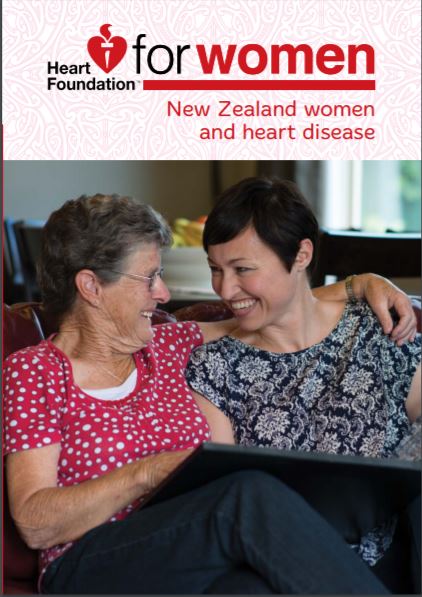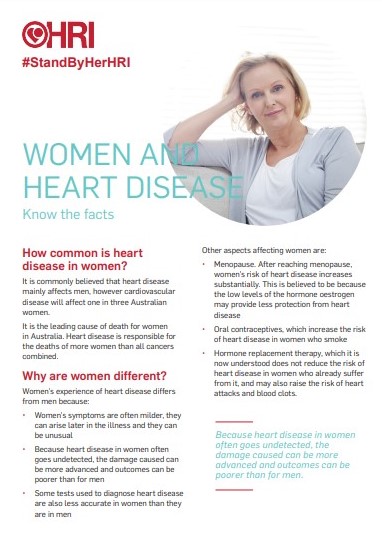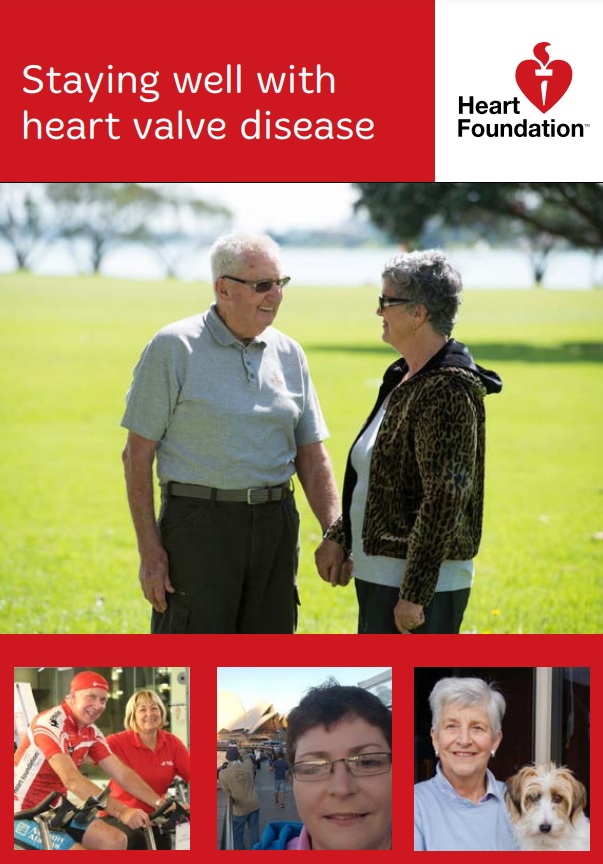You can now add Healthify as a preferred source on Google. Click here to see us when you search Google.
Heart disease in women
Key points about heart disease in women
- Women and men share largely the same risk factors for heart disease, but some can have a bigger effect on women than men.
- Heart disease symptoms in women tend to be milder, less ‘typical’ and may not be noticeable until the heart disease has progressed further, so you need to learn what to look for.
- Heart disease also tends to occur at a later age for women than men, due to an increased risk after menopause.
- The age when you need to start having regular heart health checks depends on your sex, ethnicity and other risk factors.
- While some risk factors can't be changed, many heart disease risk factors can be reduced with a change in lifestyle.

Women and men share largely the same risk factors for heart disease. These include smoking, being overweight, being inactive, having high blood pressure or high cholesterol and having diabetes, as well as a family history of heart disease.
However, some of these risk factors can affect women differently:
- Women metabolise nicotine faster than men, so smoking creates a bigger risk for women.
- Women with diabetes are at a greater risk of heart disease than men with diabetes.
- A family history of heart disease can be a stronger predictor of heart disease in women.
In addition, the following risk factors affect only women:
- gestational diabetes or pre-eclampsia during pregnancy
- hormonal dysfunctions such as polycystic ovary syndrome
- menopause – after menopause, a woman’s risk of heart disease increases substantially. This is believed to be because the low levels of the hormone oestrogen may provide less protection from heart disease.
Women’s symptoms are often milder and less ‘typical’. There may be no obvious symptoms until the heart disease is well developed. For example, while both men and women often experience central chest pain when having a heart attack, women often interpret this pain as indigestion because they do not expect a heart attack. Read more about heart attack symptoms in women.
Some tests used to diagnose heart disease are also less accurate in women than they are in men. Because heart disease in women often goes undetected, the damage caused can be more advanced and outcomes can be poorer than for men.
See your GP for a heart risk assessment or heart check to help you find out your risk of heart disease. Your GP will build a picture of your risk based on factors such as your age, sex, ethnicity, cholesterol levels, smoking history, blood pressure, family history and other health conditions.
The age when you are advised to start having heart checks depends on your sex, ethnicity and other risk factors.
If you are a woman, you should start seeing your GP for a heart check at the following ages:
- All women without known risk factors from 55 years of age.
- All women with significant known heart disease risk factors from 45 years of age.
- All Māori, Pacific or South Asian women from 40 years of age.
- All women with type 2 diabetes as part of the annual diabetic review.
- All women with severe mental illness from 25 years of age.
Read more about heart risk assessment.
My Heart Check
As well as seeing your GP for a heart check, you can check your heart health with My Heart Check(external link). It's a free online heart health check designed for Kiwis by the Heart Foundation.
While some risk factors cannot be changed, most heart disease risk factors can be reduced with a change in lifestyle.

Image credit: Canva
You can help reduce your risk of heart disease by taking steps to change the factors that put you at greater risk:
- be smokefree – get support to quit smoking and avoid secondhand smoke
- control your blood pressure through lifestyle changes and medicine
- lower your cholesterol if it’s high through changes to your diet and medicine if needed
- aim for a healthy body weight
- manage your blood glucose levels well (if you have diabetes)
- eat for a healthy heart
- follow low-risk drinking advice
- be physically active
- learn to manage stress
- seek help if you feel depressed.
Learn more about risk factors for heart disease.
Apps reviewed by Healthify
You may find it useful to look at some
Apps reviewed by Healthify
You may find it useful to look at some Quit smoking apps, Blood pressure apps, Alcohol use apps, Depression apps, Diabetes apps, Self-management apps and Nutrition, exercise and weight management apps.
Heart Foundation NZ(external link) provides information and support for people who are living with a heart condition. Visit their website(external link) or call the Heart Line on 0800 863 375. This phone line is managed by a consumer care representative who can support you with heart health information, health service navigation and access to resources and support.
Women and heart disease(external link) Heart Foundation, NZ
Women and heart disease(external link) Heart Research Institute, NZ
Lower your risk of heart disease(external link) Heart Foundation, NZ
What is a heart check?(external link) Heart Foundation, NZ
Apps
First aid and emergency apps
Quit smoking apps
Blood pressure apps
Alcohol use apps
Depression apps
Diabetes apps
Self-management apps
Nutrition, exercise and weight management apps
Resources
NZ women and heart disease(external link) Heart Foundation, NZ, 2017
Women and heart disease – know the facts(external link) Heart Research Institute, Australia
Staying well with heart valve disease(external link) Heart Foundation, NZ, 2020
My healthy heart journey [PDF, 5 MB] Health New Zealand | Te Whatu Ora and Ministry of Health, NZ
Cardiovascular disease risk assessment and management for primary care(external link) Ministry of Health, NZ, 2018
Māori, Pacific, Aboriginal and Torres Strait Islander women’s cardiovascular health – where are the opportunities to make a real difference?(external link) Heart, Lung and Circulation, 2020
Cardiology Research Review Issue 80(external link) Research Review, NZ, 2019
See our page Heart failure for healthcare providers
Apps
First aid and emergency apps
Quit smoking apps
Blood pressure apps
Alcohol use apps
Depression apps
Diabetes apps
Self-management apps
Nutrition, exercise and weight management apps
Brochures

Heart Foundation, NZ, 2017

Heart Research Institute, Australia

Heart Foundation, NZ, 2020
Credits: Healthify editorial team. Healthify is brought to you by Health Navigator Charitable Trust.
Reviewed by: Dr Sharon Leitch, GP and Senior Lecturer, University of Otago
Last reviewed:
Page last updated:





